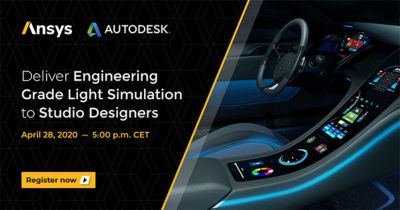-
-
Kostenlose Software für Studierende
Ansys unterstützt die nächste Generation von Ingenieur*innen
Studenten erhalten kostenlosen Zugang zu erstklassiger Simulationssoftware.
-
Verbinden Sie sich jetzt mit Ansys!
Gestalten Sie Ihre Zukunft
Stellen Sie eine Verbindung mit Ansys her, um zu erfahren, wie Simulation Ihren nächsten Durchbruch vorantreiben kann.
Länder und Regionen
Kostenlose Demoversionen
Produkte & Dienstleistungen
Lernportal
Über das Unternehmen
Back
Produkte & Dienstleistungen
Back
Lernportal
Ansys unterstützt die nächste Generation von Ingenieur*innen
Studenten erhalten kostenlosen Zugang zu erstklassiger Simulationssoftware.
Back
Über das Unternehmen
Gestalten Sie Ihre Zukunft
Stellen Sie eine Verbindung mit Ansys her, um zu erfahren, wie Simulation Ihren nächsten Durchbruch vorantreiben kann.
Kostenlose Demoversionen
ANSYS BLOG
April 6, 2020
Launching an Optical Design and Engineering Workflow with Autodesk VRED
During product development, a design studio’s vision won’t always conform to the realities and constraints that confront engineering teams. For example, its vision could involve incorporating a uniform light source to illuminate an entire panel. However, the optics of the lighting source and system may result in only a portion of the panel being illuminated.
The disconnect between concept and reality could potentially extend into a costly and time-consuming iterative process, where the design and engineering teams repeatably bounce between ideas until they land on something that is both safe and aesthetically pleasing.
To empower the decision-making abilities of these teams and to protect the design vision, Ansys and Autodesk created a joint workflow for automotive companies. It combines 3D visualization and virtual prototyping software with physics-based lighting simulation solutions.
Ansys and Autodesk Close the Gap between Lighting Design and Engineering
Workflow and communication challenges between engineering and design are partly due to a lack of physics-based simulation tools being made available to non-experts. This is a challenge because physically accurate lighting simulations are required to ensure the:
- Accuracy of the development process
- Perceived quality of the product
- Visibility of the interior dashboard systems and light guides
- Detection of potential faults.
The intended lighting result (left) compared with initial engineering results (right).
Traditionally, the design team passes their models to engineers who then pass back their simulation results. Not only is this time consuming, it can also introduce data inconsistencies when importing data between different software tools.
Ansys and Autodesk aim to address this challenge by combining Autodesk VRED Professional with the physics-based light simulation capabilities of VRXPERIENCE Light Simulation. This workflow will help ensure data consistency and place physics-based lighting simulations in the design team toolbox.
The workflow is also able to detect defects in a design that can’t be discovered without optical simulations. For instance, the design team will be able to identify dark spots and light leakage without sending their models to an engineering team. This will expediate the development cycle as designs can be optimized with the help of on-demand simulations.
By enabling the design studio to run a considerable amount of simulations themselves, the engineering team will free up its time as it will only be required to verify the final design, in Autodesk VRED. This will enable the team to focus on other development issues.
Through the Autodesk VRED Professional and VRXPERIENCE Light Simulation workflow, design teams are able to:
- Mesh Autodesk VRED designs and import them into VRXPERIENCE Light Simulation
- Import engineering data, optical components from Ansys Speos and other optical software
- Add optical properties, material properties and lighting sources using the Ansys Optical Library
- Run high-performance computing (HPC) compatible Speos-based ray file simulations
- Generate ray files
- Import ray files into Autodesk VRED to generate raytraced photorealistic renderings
To learn how to combine Ansys VRXPERIENCE and Autodesk VRED Professional workflows, watch the webinar: Deliver Engineering Grade Light Simulation to Studio Designers or the video below.
Illuminate Your Design with Ansys VRXPERIENCE Light Simulation
Ansys VRXPERIENCE Light Simulation delivers an integrated workflow between digital design and engineering simulation by delivering physics-based light simulation to studio designers. By importing the software’s physics-based light simulation data into Autodesk VRED, you can visualize your final result in a photorealistic model that delivers a 100% true to life representation. Watch this dynamic video to learn how you can leverage VRXPERIENCE Light Simulation to power your design decision making, ensure your design intent, create powerful and innovative lighting systems and visualize your future product prior to production in Autodesk VRED.
Ansys Video
Illuminate Your Design with Ansys VRXPERIENCE Light Simulation
Any and all ANSYS, Inc. brand, product, service and feature names, logos and slogans such as Ansys, Ansys Speos and Ansys VRXPERIENCE are registered trademarks or trademarks of ANSYS, Inc. or its subsidiaries in the United States or other countries.


